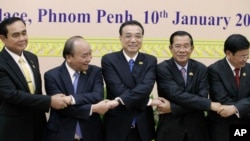Leaders of nations along Southeast Asia's Mekong River gathered Wednesday in Cambodia's capital amid a push by China to build more dams that are altering the water flow and raising environmental concerns.
The meeting was chaired by Cambodian Prime Minister Hun Sen and Chinese Premier Li Keqiang, who were joined by leaders from Thailand, Laos, Vietnam and Myanmar.
The stated goal of the Mekong-Lancang Cooperation forum, created by China in 2015, is to promote sustainable development and boost the quality of life for the millions of people living in the Mekong subregion.
Known as the Lancang in China, the Mekong River is vital to Southeast Asia, where more than 60 million people rely on it and its tributaries for food, water and transport.
The world's 12th-longest river, the Mekong runs nearly 5,000 kilometers (3,100 miles) from the Tibetan Plateau down into mainland Southeast Asia before emptying into the South China Sea in Vietnam. The river's basin is home to up to 1,700 fish species, making it the most diverse basin after the Amazon and Congo.
Yet the river is also another potential source of regional tensions due to an increasing number of hydroelectric projects that are altering its flow and raising concerns of ecological damage. Vietnam, already locked in conflict with Beijing over territory in the South China Sea, says it is at particular risk of adverse effects.
China is the driving force behind many of the projects, having already built eight dams on the river since the 1990s and is currently building or planning more than a dozen more. Laos is home to most of the dams planned for the river's lower stretch.
China is also seeking to have parts or the river dredged or rapids cleared so that large cargo ships can navigate it. Environmentalists have warned this could have dire consequences on the ecosystem.
In the two years since the forum's establishment, China has set aside billions of dollars to support 45 projects including water resource research centers and cooperation on connectivity projects, industrial capacity, border trade, agriculture and poverty alleviation.
The forum is seen as a rival to the Mekong River Commission, which has existed for more than 60 years but excludes China and Myanmar.







